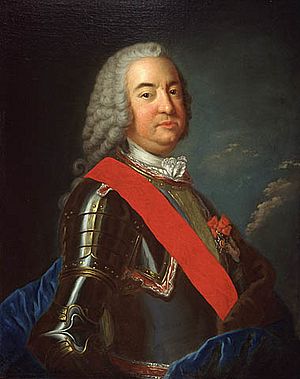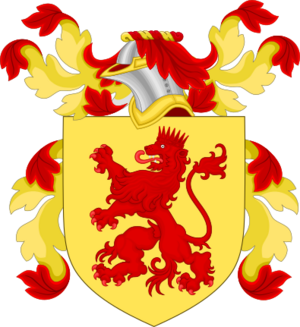Pierre de Rigaud, marquis de Vaudreuil-Cavagnial facts for kids
Quick facts for kids
Marquis de Vaudreuil-Cavagnial
|
|
|---|---|

Portrait of Vaudreuil by Donat Nonnotte
|
|
| 13th Governor General of New France | |
| In office 1755–1760 |
|
| Monarch | Louis XV |
| Preceded by | Marquis Du Quesne |
| Succeeded by | Jeffery Amherst as Governor of the Province of Quebec |
| 10th French Governor of Louisiana | |
| In office 1743–1753 |
|
| Monarch | Louis XV |
| Preceded by | Jean-Baptiste Le Moyne |
| Succeeded by | Louis Billouart de Kerlérec |
| 21st Governor of Trois-Rivières | |
| In office 1733–1742 |
|
| Monarch | Louis XV |
| Preceded by | Josué Dubois Berthelot de Beaucours |
| Succeeded by | Claude-Michel Bégon de la Cour |
| Personal details | |
| Born |
Pierre de Rigaud de Vaudreuil de Cavagnial
November 22, 1698 Quebec, New France |
| Died | August 4, 1778 (aged 79) Paris, France |
| Spouse |
Jeanne Charlotte de Fleury Deschambault
(m. 1746; died 1763) |
| Military service | |
| Allegiance | |
| Branch/service | French Navy |
| Years of service | 1708–1761 |
| Rank | Captain |
| Battles/wars | French and Indian War |
| Awards | Order of Saint Louis Grand-Croix |
Pierre de Rigaud de Vaudreuil de Cavagnial (born November 22, 1698 – died August 4, 1778) was an important French colonial governor. He was born in Quebec, which was then part of New France. He served as governor of French Louisiana from 1743 to 1753. Later, in 1755, he became the very last Governor-General of New France. The British took control of the colony in 1759 and 1760 during the Seven Years' War. This war is also known as the French and Indian War in the United States.
Early Life and Career
Pierre de Vaudreuil was born in Quebec. His father, Philippe de Rigaud Vaudreuil, was also a Governor-General of New France. His mother was Louise Élisabeth de Joybert. Pierre was the uncle of Louis-Philippe de Vaudreuil.
He joined the French army as a young officer. In 1733, he became the governor of Trois-Rivières. He then served as governor of French Louisiana from 1743 to 1753. During his time in Louisiana, he showed great skill as an officer and a leader. He married Jeanne-Charlotte de Fleury Deschambault while he was there.
In 1753, he moved to France. Two years later, in 1755, King Louis XV chose him to be the governor of New France.
Governor of New France
As governor, Vaudreuil was the top civil leader in Canada. He was also the commander of all French forces. However, he often disagreed with Montcalm, who was the main military commander. The two men did not get along, which made it harder for France to win the war.
The British forces, led by Maj. Gen. James Wolfe, defeated Montcalm at Quebec City. This battle was called the Battle of the Plains of Abraham. After this loss, Vaudreuil tried to keep fighting the British. But it was too late. He had to surrender Montreal to Maj. Gen. Jeffrey Amherst on September 8, 1760. This marked the end of French rule in New France.
Later Life
After the war, Vaudreuil faced some difficulties. He was later cleared of any wrongdoing. He received a pension and a military award. He sold his lands in Canada and moved to his family's estate near Rouen, France. He passed away in Paris on August 4, 1778.
His nephew, Louis-Philippe de Vaudreuil, was also a brave naval officer. He helped the Americans during the American Revolution. He was part of the French fleet that defeated the British at the Battle of the Chesapeake in 1781. This battle was important during the siege of Yorktown.
Legacy
In Literature
Pierre de Vaudreuil is mentioned in some historical novels. He appears in Kenneth Roberts' Arundel and Rabble in Arms.
See also
- Articles of Capitulation of Montreal
- Timeline of Quebec history
- Philippe de Rigaud Vaudreuil
- Louis-Philippe de Vaudreuil
 | Tommie Smith |
 | Simone Manuel |
 | Shani Davis |
 | Simone Biles |
 | Alice Coachman |


